
10 Parenting Tips That Help You Use Your Powerful Human Toolbox
• Together these 10 parenting tips make up an incredibly powerful cocktail!
• Each parenting tip can be seen as an important tool in the parenting toolbox!
• In this parenting article you can learn how to use these basic human tools as good parenting skills.
• Your 10 tools are:
1) Your soul, higher consciousness!
2) Your heart, unconditional love!
3) Your brain and logic!
4) Your body, physical power!
5) Your personality gifts!
6) Your true identity!
7) Your natural skills!
8) Your full presence!
9) Your critical sense!
10) Your sense of humor!
• Now, lets go through these 10 parenting tips one by one!
1) How to Use Your Soul and Higher Consciousness in Your Parenting!
- Listen to your intuition and trust your gut feeling when you're in doubt as to what to do or need to make an important decision!
This one is probably one of the most important tips of the 10 parenting tips.
In my opinion; Being in contact with your intuition or higher sense of consciousness is simply what makes the difference between being a conscious, open-minded and empathic parent vs. a rigidly rule-bound and judging parent.
Okay, you may think, this all very good but how do I do it? How do I get to hear what my higher consciousness has to say?
There are probably many ways to do it, but this is how I do it. This is my step by step model:
- When I'm in doubt as to what to do or find myself in the middle of some crisis or toddler tantrum, I try to take an emotional and mental time out from the situation.
- Trying to keep a completely open mind and being as neutral as possible I ask myself: "What does my child need?" The thing is, you see, that behind any toddler tantrum or 'bad' behavior your kid has a need that you can help him or her meet.
- Perhaps I sense that my son is frustrated because he feels disempowered and overruled (Solution: Empower him by letting him choose something within my set framework) or perhaps he's uncomfortable because feels lost and 'unwhole'
(Solution: Take time out from what I'm doing to sit down and bond and hug) or perhaps my child is confused about a decision I've made (Solution: Thoroughly explain in concrete terms and consequences why I've made the decision. Even though my three year old may not understand everything I say, he does understand that I respect him enough to explain it to him!) . - Your child's needs can be everything from a need for bonding, attention, understanding, respect, autonomy, choice, security, predictability and meeting expectations, consistency, unconditional love and support, deep presence, space and time, calm and quiet, food & sleep etc.
You can read more about why contacting your intuition or 'Wiser Self' is so extremely important in my parenting article Good Parenting Skills.
Now, let's proceed with the second tip of the 10 parenting tips.
2) How to Use Your Heart and Unconditional Love in Your Parenting!
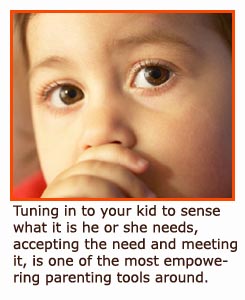
- Use the power of your unconditional love to stop tantrums and heal your child!
Of the 10 parenting tips this tip is unquestionably one of the most effective and powerful ones.
Meeting your child with unconditional love, support and acceptance will typically both stop the tantrum and empower your kid.
Why?
Because when a child is angry, frustrated or sad that is when he or she really needs to feel loved and accepted for who he or she is ... no matter how much he or she has screwed-up.
This is why the unconditional positive regardis one of the most powerful tools in humanist therapy (and in parenting for that matter). Looking at someone with the unconditional positive regard is showing full acceptance of another person no matter what they've done or said.
Yes, it is challenging to show unconditional acceptance when you're tired, frustrated and don't approve of your kid's behavior but I can tell you, it is powerful stuff ... and it works! (At least it has to me!)
This is how I do it:
- When I sense an unbalanced energy from my kid e.g. anger, frustration, irritation, restlessness, clinginess or sadness, I stop what I'm doing and try to tune in and bond with my kid. Why? Because I'm sensing a need (See typical needs in parenting tip No. 1)!
- Then I try to be conscious of not riding along on the same emotional horse as my son. This is extremely difficult, I know, because it is so tempting to just yell back at our kid to instantly silence him or her. However, doing that will not empower our kids, on the contrary. It will be like using a tool of fear to control our kids' behavior: "Obey now, or your won't get to feel my affection!" Not something that is constructive in the long term or heals right now!
- So whatever I sense from my son, I try to accept it. I say to myself: "It's just an emotion. There's a reason it there!"
- So if my son has thrown his milk all over the floor in sheer frustration of something, I try to keep my calm and accept his energy (this not the same as approving of his behavior!).
- First I do damage control: I remove him from the milk. Then I sit down with him physically and hold him tight against my body. This move alone calms him (the need of being accepted). Then I calmly talk to him while we have the whole scene in plain view in front of us. Having sensed that he was frustrated because his milk was too cold, I say: "Were you angry because your milk was too cold?
You had just been looking forward to nice warm milk and then you were disappointed because it was all cold? (his need for routine and predictability had been broken) Okay, listen, we'll both go and make it right but first we need to clean up because when we have milk all over the floor we will get wet socks and it will also stain the floor, which will make Mom unhappy. (explaining the concrete consequences of his actions)
And then afterwards, we make another bottle. Okay? (we're making a 'joint' decision which makes him feel empowered in the sense of feeling he is included in what's going to happen!)
- In this way I try to meet my son's need for predictability and being understood and accepted while at the same time addressing the consequences of his actions.
This idea of not using punishment to resolve conflicts is one of the core pillars in the inspiring and radical parenting style of unconditional parenting.
Having gone through soul and heart, let's look at number 3 of the 10 parenting tips, our brain.
3) How to Use Your Brain in Your Parenting!
- Use your mental creativity and logic when accessing your intuition is difficult!
When we are in balance we actually don't need our brain that much in parenting. However, when we're stressed, it can be really difficult to feel what our gut is trying to tell us.
Therefore contacting your intuition to find out what your kids need might be in vain when you're upset or tired.
Fortunately this doesn't mean that you're powerless and can't fulfil your kid's needs.
You can! It might just take a bit longer.
This is what I do when for some reason I can't access my intuition:
- When I sense my kid is upset and I can't immediately find out why, I just get mentally creative.
- I just try out different need meeting strategies like bonding, suggesting choices for him to make or giving space etc.
- Then at some point I will hit the nail on the head. And along the way I will probably be guessing wrong. However, if the need is autonomy (e.g. wanting to decide something for himself) and I have tried to physically bond with him, even though I guessed wrong, it won't have harmed him!
- If this seems challenging and focusing on needs seems very far off your own usual strategy, it may be a good idea to have a list with potential needs handy. Simply write down the mentioned needs above (see parenting tip No. 1) and just add some more if you find the list incomplete.
- Then when your kid acts out, take a look at this list to see if there's a need that might fit your kid's situation!
- For instance if the need seems like being wanting attention, ask yourself: "How can I give my kid attention". This may include, stopping a conversation with another adult for 2 minutes while fuelling up your kid. Or it may mean stopping your cooking for 2 minutes and get down on your knees and hold your kid or take your time to initiate an interesting game.
All this may sound like a self sacrifice or like permissive parenting. However, it's about fuelling up our kids with what they really need to feel whole, secure and happy.
Because you see, when our kids don't need anything, there's no reason to act out. It's a very simple piece of logic. Read more about killing a tantrum with unconditional love.
Having touched upon soul, heart, brain, let's now proceed to number 4 of the 10 parenting tips, our body.
4) How to Use Your Body in Your Parenting!
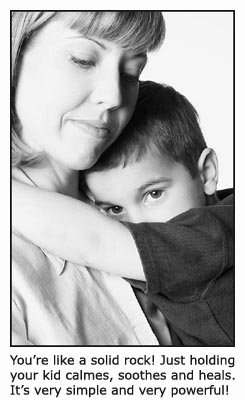
- Discover and use the raw healing power and calming effect of your touch.
When children are restless or unhappy they may have difficulty calming down by themselves.
They sort of lose themselves in a ocean of emotion and need a solid rock to hang on to. This rock is you!
These are some of the ways I use my body in my parenting:
- When I have to say 'no' to my child or explain something that is important I place my hands on him.
Typically on his chest but also on the back of his head or his back. I could also sit with him on my thighs. Then I make sure I have deep eye contact. The effect of my touch seems to calm him down while making him more mentally present and able to concentrate and therefore more open to what I have to say! - If my child throws a fit, my instant reaction is to go him, sit next to him and take him on my lap. Sometimes he doesn't want this at first because he needs to let out some steam, but he always ends up needing to bond physically. It's like I'm the solid rock which makes him relax and refuel.
- Sometimes when my child gets restless, it's because he needs to use his body. It's like his body is bursting with energy that needs to come out. If the weather's nice we may go out and play. If we can't go out, I may put on some music that we can dance to or we may make funny struggling fights in my bed!
5) How to Use Your Personality in Your Parenting!
- Use the power of your unique personality to bring out the best in your child.
All parents are different. We all have strong personal assets as well as less well working habits.
If you know about the personality test program called the Enneagram, it would mean something to you when I said I am an Enneagram type 7.
In the Enneagram, type 7 is positively characterized as a free-spirited, fun-loving adventurer that loves to play with new ideas and new visions.
The downside, among other things, is a tendency to be scatterbrained and 'running away' from negative emotions in self and others.
If you want to know your own parenting Enneagram type and want parenting advice tailor-made your personality type, please do go try my free Enneagram quiz for self esteem
These are some of the ways I use my Enneagram type 7 personality in my parenting:
- Being a rather mental type and having a fast, creative mind makes me good at initiating interesting new games for my son. I'm good at twisting an old game and making it new and interesting again.
- Being optimistic by nature means that being open and positive towards my son seems quite natural.
- While being mental can be a good thing, there are also downsides to this quality that I may sometimes struggle with. For instance, sometimes my mind just ruthlessly races off, thinking about all the nice possibilities the future holds and what else I could be doing than what I'm doing right now. This means I that sometimes I need to force myself to stay acutely present.
6) How to Use Your Identity in Your Parenting!
- When you stop trying to be something, you will be what is left: The core that is really you!
Okay that was cryptic. Let me explain it a bit further.
All our lives we have been force fed values by society, parents and friends: Some things are deemed good to be and other things we are told, are bad.
Unconsciously we label ourselves according to these consensus values. For instance, typical unconstructive norms of western society say that:
- A parent should exercise relatively strong discipline because otherwise we'll end up with a society filled with spoilt and self centred kids.
- As a adult you should be out there making big careers working more than fulltime while at the same time being a perfect parent at home.
There are so many 'a parent should' that we sometimes end up forgetting who we really are.
You can ask yourself the following parenting question and hopefully it may help you shed off some of those sticky parenting norms and find out what is really you:
- Do you feel being a parent is a lot of hard work? If yes, it might be because you have a few 'a parent should' ideas firmly locked inside your brain that do not fit who you are.
E.g. it could be: A parent should punish a child for bad behaviour otherwise the child won't learn the consequences of his or her actions, or a parent should sometimes ignore a child's crying out because otherwise the child will never learn to cope by himself or herself. - Some ideas make us do strange things that don't fit who we are and are no match to what our children need.
- When something doesn't work or we end up in a fight with our kid often it's because we're trying to hard to do stuff that is unconstructive and disempowering to all parties involved. Sometimes we need to not do - most often what we really need to do is just to be. Be ourselves and be present!
7) How to Use Your Natural Skills in Your Parenting!
- When you do what you love and what you're good at, your positive presence is like a magnet!
Parenting becomes a lot more easy and joyful if we - when we spend time with our kids - do something we love, too.
For instance, I love drawing and painting and all sort creative art work. I love sports and using my body. I love making up games and silly songs.
Inserting my own interests into my parenting naturally makes me more present and engaged which my kid obviously loves.
You could make your own parenting worksheet of how to use your natural skills in your parenting:
- First you list all the things you love to do. Don't include your kid yet. This is a full brainstorm of everything you can come up with.
- Then you go through each interest / hobby and write down possibilities of how you can include you kid. For instance if you like listening to music, you could invent some games that involved music: e.g. different ways of dancing to different music, taking turns to sing along etc.
8) How to be Present in Your Parenting!
- When building high self esteem in your child your simple but full presence works absolute wonders!
A child that feels fully seen, heard, understood and unconditionally supported doesn't need actually praise. Why? Because when a kid feels loved for who he or is, the kid doesn't need to seek the admiration and attention that come from his or her accomplishments.
One of the main ingredients in building high self esteem in children is being fully present with them.
It may sound easy but being fully present is actually something that many people struggle with. I do, too.
Some of the things that prevent us from being present or living in the now are:
- Feeling busy which makes us think and worry about the future: "Look, I don't have the time this, we need to go NOW otherwise Mom will be late!"
- Ideas and norms that makes us feel stuck in our head: "You have to eat your vegetables. You might not like them but you have to eat them. They're good for you!"
- Escaping our own boredom, restlessness and uncomfortable feelings: "Mom really needs to watch this movie. Go play in your room!"
Here are some of the things you can do when you feel yourself drifting away from the present:
- When you feel busy, ask yourself: "Am I really busy?" Often it's just your inner record that is stuck! You feel busy but actually there's no rush! Or if you really are very busy perhaps you could ask yourself, is it worth it? Most often it won't be!
- When you feel bored with your kid try to force your thoughts into what your doing. Try not to think about past or future only about what you're doing right now!
- When your kid is angry or throws a tantrum try to just be present. Say to yourself everything is okay. I can take this. Your child will feel your power and be empowered by it because you show your kid that you accept him or her!
9) How to Use Your Critical Sense in Your Parenting!

- Be aware that general parenting advice is not necessarily the truth and may not fit you or your child!
Society has always projected ideas about the ideal parenting behavior: "If you don't do this or that your child will not do well."
Doing what you feel is right for your child may not be what traditional child discipline dictates. Because of this we often end up doubting ourselves.
When you're in doubt use your critical sense:
- Listen to what your parents, your friends, the 'expert' books have to say but don't take the advice or knowledge for granted.
- When you are presented with an idea try to sense if it feels right in you gut!
- Ask yourself: "Does this piece of advice / idea fulfil a need in my child? Does it support and empower my child?"
- If the advice doesn't help you fulfil a need in your child or if it disempowers you kid, you can probably safely throw the advice right out your window!
10) How to Use Your Sense of Humor in Your Parenting!

- Take what you are - your identity - seriously but perhaps be less concerned about how you appear to others!
Yes, you can be true to yourself while making fun of yourself.
In fact, if everybody were more true to who they really were and at the same time took their appearance less seriously, the world would probably be a lot fun for everybody.
Many people today are so concerned with their image that they are willing to change who they truly are which makes them deeply unhappy (e.g. you love gardening and being around the house but being a lawyer is good 'cultural capital' and is what is expected of you).
Here are some ways to take things less seriously:
- Act silly with your child sometimes. Your kid will love to see that it's okay not to be so serious and norm bound!
- When I talk with my child I sometimes suddenly put in a sentence doesn't at make sense, like for instance: "Tonight Mom will be cooking meatloaf, potatoes, broccoli and then I'll make a sauce with a little bit of mud, uhm..." My son loves this and screams in joy when he hears something absurd that doesn't make sense in normal sentence!
- I sometimes change the lyrics of children songs which make them less 'correct' (e.g. using words like fart) but a lot more fun for a kid.
Sometimes parenting is about cutting ourselves some slack. If you're in a mood for fun, you can read some of my perfect parenting oops'es here.
I hope these 10 parenting tips from our human toolbox were of use to you. If you're looking for even more positive parenting tips and practical advice, you're welcome to continue your visit on my positive parenting website. See more parenting articles at bottom of this 10 parenting tips page.
Your Positive Parenting Ally,
Birgitte

Want to stay in touch and get the latest news?
Sign up
for my free newsletter
Parent Coaching
- For Inner Peace, Clarity and a Deeper Connection to Your Child
 Being a parent can feel like a double-edged sword. Life with kids may feel like the greatest gift you have ever received, while at the same being hugely challenging, often leaving you confused, stressed and overwhelmed.
Being a parent can feel like a double-edged sword. Life with kids may feel like the greatest gift you have ever received, while at the same being hugely challenging, often leaving you confused, stressed and overwhelmed.
When we feel like this, we've lost touch with ourselves. We can't hear our own inner voice, and it's difficult to know what is 'right' for us and how to act.
I offer in-depth parent coaching to help you regain your balance and get back in touch with yourself. From a place of inner peace and clarity, your will find your own answers which will help you reconnect with your child from a place of unconditional love and acceptance.
Read more about my parent coaching here.
Where Would You Like to Go Next?
Conscious and Empowering Parenting Tips
 The Fabulous Fountain of Parenting Tips! A Resourceful Positive Parenting Article. |
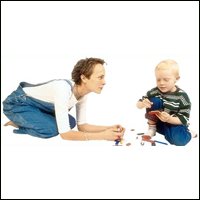 10 Powerful Positive Parenting Tips How to Give Your Children Empowerment! |
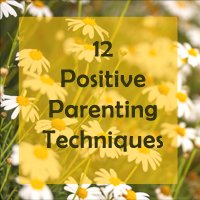 Positive Parenting Techniques Practical Parenting Tips to Simply Your Day While Empowering Your Kids! |
 Positive Discipline Techniques Use the Raw Power of Presence & Beingness and See Your Kids Empowered and Encouraged! |
Funny Parenting Tips
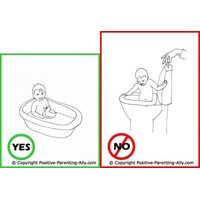 Funny Parenting Tips & Hilarious Mom Humor Funny Drawings and Sketches! |
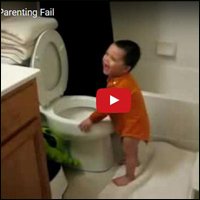 Funny Parenting Tip Treasure Hilarious Parenting Videos & Funny Kids Videos That'll Light up Your Day! |
Back to the top of this page about 10 Parenting Tips That Help You Use Your Powerful Human Toolbox
Go to the Positive Parenting Ally Homepage







